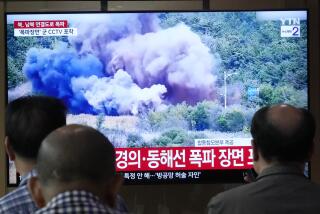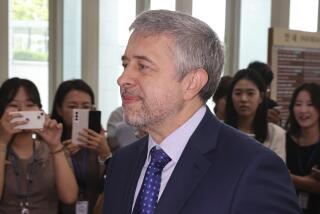China Under Pressure to Cut a Lifeline
DANDONG, China — Twice a day, long lines of trucks filled with fruit, small appliances, potatoes and rice wend their way for several blocks along Binjiang Zhonglu Street before negotiating a sharp turn onto the Sino-Korean Friendship Bridge leading into North Korea.
These deliveries, like the single-lane bridge over the Yalu River, are a lifeline for the impoverished communist state, and the recent focus of international attention as the United States and other countries pressure China to use its trade leverage to force North Korea back to the nuclear negotiating table.
From China’s perspective, however, it’s not quite that easy. Beijing has as much interest in solving the crisis as Washington does, experts say, but it has limited leverage with North Korea, which declared last month that it had a nuclear weapon.
“China can’t control these guys,” said Yan Xuetong, international relations expert at Beijing’s Qinghua University. “If they could, North Korea would never have announced its nuclear capability in the first place.”
There is also debate in China about the wisdom and efficacy of pressing North Korea in such a way.
Although the nation may be impoverished and in need of just about everything, it remains extremely proud, convinced that its rigorous, disciplined society makes it at least the equal of China.
“They don’t regard China as a big brother,” said Hu Qinghua, 25, who was born and raised in North Korea before settling in Dandong a few years ago under a program that allows ethnic Chinese to repatriate. “They even look down on us a bit, calling us the ‘Chinese mob.’ ”
A blockade of the bridge would be viewed as blackmail by the North Koreans, more likely to make them clam up in anger than open doors to dialogue, analysts said. And it could blunt Beijing’s influence with leaders in Pyongyang, the capital, when it’s needed most -- if and when a deal is forged to stem North Korea’s weapons program.
“In North Asian cultures, if you use your leverage too openly, you just make people angry,” said Mei Renyi, a professor with Beijing Foreign Studies University. “You get much more over the long run if you let them save face and make them feel it’s their decision.”
Like most information about North Korea, detailed trade statistics are not available, nor is the number of trucks and trains that cross annually into China. But locals say thousands of people are employed in manufacturing, transporting and selling goods on both sides of the border.
Dandong, a once-sleepy garrison town, has been revitalized by its proximity to the border and by the estimated 500 local companies engaged in trade.
The pressure China faces to sever this link has come from Washington and, increasingly, Tokyo, which recently tightened its waterborne trade with North Korea by imposing new insurance and safety requirements on arriving vessels.
Secretary of State Condoleezza Rice on Friday called on China to do more to bring Pyongyang to the negotiating table. “I’ll leave to the Chinese what leverage they use or what mechanisms they use, but I do think it is important that the diplomacy that the Chinese do with the North Koreans be effective,” she told reporters aboard her plane.
Rice is on a four-day swing through Tokyo, Seoul and Beijing, with the nuclear crisis a major focus of discussion.
The shared Chinese-North Korean border also hampers China’s ability to adopt a more confrontational stance with North Korea, some say. With the North’s economy already on life support, any new blow risks sending thousands of desperate people into China. Beijing reportedly deployed more soldiers to the border last year amid fear that the regime was near collapse.
“North Koreans are so poor, they come over and do bad things along the border,” said Yu Tiansheng, 41, a Dandong taxi driver, voicing a local concern.
China is also constrained by an internal political debate over how hard a line to take against North Korea, accentuated by the countries’ shared history, ideology and memories of better times.
Both became communist states in the late 1940s, led by China’s Mao Tse-tung and North Korea’s Kim Il Sung, revolutionaries who enjoyed enormous respect and a founding-father appeal among their people.
Soldiers from the two countries fought side by side against American-led U.N. forces during the 1950-53 Korean War, creating a bond that shaped a generation. And the nations remained allies throughout the Cold War, united against the West in a shared belief in socialism.
“There’s still a lack of consensus in China over whether to press North Korea,” said Jin Canrong, deputy dean of international relations at People’s University in Beijing. “These old ties always restrain policy.”
On a hill in Dandong overlooking North Korea, the museum of the Cenotaph of the War to Resist U.S. Aggression and Aid Korea -- China’s term for the Korean War -- relishes in this past. “The great friendship cementing the blood between the Chinese and Korean peoples and armies will go down in the annals forever,” reads a plaque near displays of maps, jeeps and machine guns devoted to their shared sacrifice.
“In those days, we claimed we were brothers,” a 77-year-old Dandong resident who requested anonymity said as he emerged from the museum. “A lot has changed and they’ve deteriorated. But I still have enormous sympathy toward them.”
It’s not just nostalgic old communists who are reluctant to press North Korea. A new class of Chinese entrepreneur has emerged with an interest in maintaining and fostering trade links. These businesspeople are making money.
Two-way trade between China and North Korea hit a record $1.3 billion last year, up 30% from 2003. It consisted mostly of Chinese goods moving into North Korea and raw materials moving the other way.
“I hope business between North Korea and China will keep growing,” said Geng Rentao, president of Dandong Import & Export Co., who travels to Pyongyang several times a year.
Many Chinese also recognize that what they’re seeing across the Yalu River is a reflection of themselves not so many years ago. They believe that waiting for North Korea to open at its own pace is the only hope for sustained economic reform, and that economic opening is the key to political opening.
“They’re in a state like our Cultural Revolution,” said Zhao Fusheng, 23, a worker at a Japanese restaurant in Dandong whose windows overlook the North. “The slogans are poured into their brains. We’ve moved on and they’re still there.”
North Koreans can easily see the construction cranes, new condominiums and traffic-clogged streets on China’s side of the river. “Forever Wish of Woman” blares a billboard for skin care products along the shore near the Leisure and Massage Center, with images of bikini-clad Western women.
“China would like very much to see any kind of opening and reform in North Korea,” international relations professor Jin said. “It would relieve some of China’s burden. But it’s not something you can push. We just have to wait until they’re ready.”
Yin Lijin in The Times’ Beijing Bureau contributed to this report.
More to Read
Sign up for Essential California
The most important California stories and recommendations in your inbox every morning.
You may occasionally receive promotional content from the Los Angeles Times.










